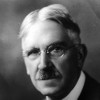“ The opposite of a career is neither leisure nor culture, but aimlessness, capriciousness, the absence of cumulative achievement in experience, on the personal side, and idle display, parasitic dependence upon the others, on the social side. ”
John Dewey, Democracy and Education (1916). copy citation
| Author | John Dewey |
|---|---|
| Source | Democracy and Education |
| Topic | achievement experience |
| Date | 1916 |
| Language | English |
| Reference | |
| Note | |
| Weblink | http://www.gutenberg.org/files/852/852-h/852-h.htm |
Context
“So deeply entangled are these philosophic dualisms with the whole subject of vocational education, that it is necessary to define the meaning of vocation with some fullness in order to avoid the impression that an education which centers about it is narrowly practical, if not merely pecuniary. A vocation means nothing but such a direction of life activities as renders them perceptibly significant to a person, because of the consequences they accomplish, and also useful to his associates. The opposite of a career is neither leisure nor culture, but aimlessness, capriciousness, the absence of cumulative achievement in experience, on the personal side, and idle display, parasitic dependence upon the others, on the social side. Occupation is a concrete term for continuity. It includes the development of artistic capacity of any kind, of special scientific ability, of effective citizenship, as well as professional and business occupations, to say nothing of mechanical labor or engagement in gainful pursuits.”
source


